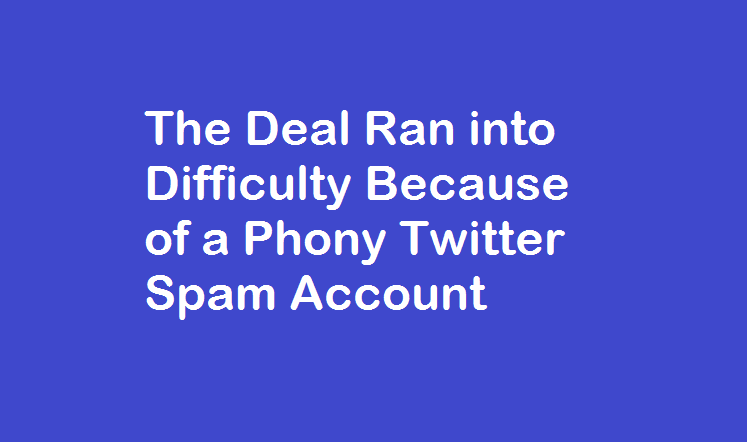The deal was supposed to be a breakthrough for the company, but according to New York Times, it hit a roadblock when a phony Twitter spam account surfaced. This account was created to spread misinformation about the deal and confuse potential investors. The account made false claims about the financial health of the company and its ability to execute the terms of the deal.
As news of the fake account broke, investors started getting nervous and pulling out their commitments. The company tried to reassure them that everything was on track, but it was too late – confidence had been eroded, and trust had been broken. Ultimately, the deal fell apart due largely to this fake Twitter account.
This incident is a stark reminder of how powerful social media can shape public opinion. It’s also a cautionary tale for companies looking to make deals or raise capital – they need to be extra vigilant when monitoring their online reputation and countering any false information that may emerge.
The discovery of the phony account
The discovery of the phony account brought to light a major issue faced by businesses in the digital age. With so much focus on social media and online presence, it has become easy for malicious actors to create fake accounts and impersonate legitimate brands. In this case, the spam account caused significant damage to the deal as it spread false information about the company and its products.
This incident highlights the importance of companies being vigilant about their online reputation. Regularly monitoring social media channels and quickly addressing any issues can help prevent such situations. It is also crucial for businesses to educate their employees on how to identify and report potential scams or fraudulent activity.
While discovering the phony account may have caused difficulties in this particular situation, it served as a valuable lesson for businesses on the importance of maintaining a strong online presence while remaining aware of potential threats.
Impact on the deal negotiations
The existence of a phony Twitter spam account can significantly impact deal negotiations. This situation can cause mistrust and raise questions about the parties’ credibility in the negotiation. If one party suspects the other is behind the fake account, it can lead to accusations and a communication breakdown.
In some cases, negotiations may need to be put on hold until the issue with the fake account is resolved. This can cause delays and frustration for both paved, as they are likely eager to finalize the deal as soon as possible. Additionally, if word gets out about the issue with the spam account, it could damage reputations and future business relationships.
Overall, dealing with a phony Twitter spam account during negotiations is challenging and requires careful handling by all parties involved. Addressing these issues swiftly and transparently is crucial to minimize negative impacts on deals.
Attempts to identify the culprit
According to CBC news, The first attempt to identify the culprit of the phony Twitter spam account was to trace its IP address. However, this led to a dead end as the account had already been deleted when investigators got hold of it. The next step was to analyze the language and tone used in the tweets, which suggested that someone with a grudge against the company likely created it.
Further investigation revealed that several former employees had left on bad terms and may have had a motive for creating the fake account. Interviews with these individuals yielded no conclusive evidence, but suspicions lingered. With concrete evidence and witness testimony, it proved possible to identify who was behind the phony Twitter spam account.
rajkotupdates.news:deal-got-in-trouble-due-to-fake-spam-account-of-twitter
Resolving the issue and moving forward
Several steps can be taken to resolve the issue of a phony Twitter spam account causing difficulty for a deal. The first step is to identify and report the account to Twitter so it can be removed. Then, any damage caused by the fake tweets should be assessed and addressed to those affected. It may also be necessary to communicate with any partners or stakeholders involved in the deal about the situation and how it has been resolved.
Moving forward, measures should be put in place to prevent similar incidents from occurring in the future. This could mean implementing stricter security protocols for social media accounts or conducting more thorough background checks on potential partners or collaborators. Additionally, it is important to maintain transparency and open communication channels between all parties involved to address any issues that may arise quickly. By taking these steps, organizations can better protect themselves from fraudulent activity and ensure smoother business dealings.
Read Also: rajkotupdates.news:a-historic-day-for-21st-century-india-pm-modi-launched-5g-in-india

